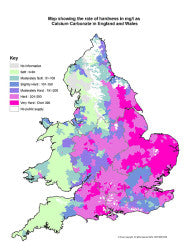Hard water locks up herbicide activity
 Weed control specialists Richard Allen and Jamie Page of Complete Weed Control (CWC) highlight the reliability of control they consistently achieve with Proliance Quattro. Dr Andrea Hawkins of Syngenta explains the science behind the improved performance.
Weed control specialists Richard Allen and Jamie Page of Complete Weed Control (CWC) highlight the reliability of control they consistently achieve with Proliance Quattro. Dr Andrea Hawkins of Syngenta explains the science behind the improved performance.
If you are reading this article over a mug of tea, take a close look and see if there is any evidence of scum on the surface? If there is, there is a good chance your water supply is hard, and that could be compromising the performance of your glyphosate herbicide applications.
That's because the calcium in hard water that is responsible for furring up the kettle - and reacts with the air and oil in teabags to create the scum - can bind on to the active ingredient molecules in a glyphosate herbicide, and render it harmless to the weeds you are looking to kill, according to Syngenta formulation scientist, Dr Andrea Hawkins.
She warns that some of the active ingredient in standard glyphosate formulations may be locked up with calcium salts when tank-mixed in these hard water areas, resulting in highly insoluble glyphosate calcium that is inactive as a herbicide.
"To resolve this issue, Syngenta developed the System 4 Technology that is built into Proliance Quattro," reports Dr Hawkins. "This adds a source of negative sulphate ions which are more attractive to the positive calcium ions; they readily link up together and neutralise the solution, creating an inert calcium sulphate," she explains. "With the positive calcium ions therefore taken out of the equation, the glyphosate active is unaffected by the hard water and fully available to control the weeds."
 Dr Hawkins points out that a number of different positive ions, which are picked up in water sources when rain water has drained through mineral soils, can have a similar effect in potentially reducing the efficacy of standard glyphosate herbicides. "Hard water supplies affect over half the land area of England and Wales, including around 80% of the urban environments where Proliance Quattro is most widely used for weed control on pavements, embankments and amenity areas," she adds.
Dr Hawkins points out that a number of different positive ions, which are picked up in water sources when rain water has drained through mineral soils, can have a similar effect in potentially reducing the efficacy of standard glyphosate herbicides. "Hard water supplies affect over half the land area of England and Wales, including around 80% of the urban environments where Proliance Quattro is most widely used for weed control on pavements, embankments and amenity areas," she adds.
The level of hardness is typically expressed as mg/l of calcium carbonate, ranging from soft with less than 100 g/l, up to very hard when it is over 300 g/l. As a rule, the south and east of England tend to have the hardest water, which gets softer as you go north. However, throughout the country there are pockets that can be very different to any local area.
It is made doubly difficult for weed control contractors, who may be drawing from different water catchments across a wide area that could have significantly different levels of hardness.
Performance in practice
Weed control specialists Richard Allen and Jamie Page of Complete Weed Control (CWC) highlight the reliability of control they consistently achieve with Proliance Quattro. They operate across an area with some extremely hard water supplies, where the performance of some glyphosate products has been notably variable.
Mr Allen reports one trial he undertook to directly compare Proliance Quattro with another high-strength premium glyphsate demonstrated its speed of action and enhanced efficacy. "The Proliance was a clear five to six days quicker and achieved a cleaner kill in the time. That gives us greater confidence in the results we can deliver, and it's certainly appreciated by our customers."
CWC Contracts Manager, Jamie Page, adds that more city and town councils are now opting for total herbicide weed control because of the difficulty in finding staff and the physical costs of manual hoeing, as well as the damage caused to paving surfaces that allows more weeds to ingress and makes the problem continually worse. Operating two CWC franchises, for the Thames Valley and London South West, the company provides direct weed control services to local councils and operates as a specialist contractor for overall facilities managers, as well as full amenity turf management for businesses and sports amenity sites across the region.
Mr Page believes further budget pressure on local authorities is going to make value for money even more important in the future for services such as weed control, that may be viewed by some as 'non-essential'. He calculates a three or four-spray herbicide programme over the growing season can deliver significant cost savings and achieve better results, compared to traditional hoeing teams. "Any cutbacks in vegetation management are quickly apparent to the public as a sign of neglect. Our experience is that where councils have been using the system for successive years, the overall weed control results get continually better."
 The company's system involves Proliance Quattro total herbicide applied on pavements and urban areas primarily through the company's six WeedIT automatic spot-treatment machines. Mr Page highlights they are aiming to apply the minimum possible amount of active ingredient required to achieve very high levels of control. "That means we need an inherently high-performance herbicide, with a good surfactant to achieve complete leaf coverage and to ensure the product stays on the leaf.
The company's system involves Proliance Quattro total herbicide applied on pavements and urban areas primarily through the company's six WeedIT automatic spot-treatment machines. Mr Page highlights they are aiming to apply the minimum possible amount of active ingredient required to achieve very high levels of control. "That means we need an inherently high-performance herbicide, with a good surfactant to achieve complete leaf coverage and to ensure the product stays on the leaf.
"You can see that virtually all the spray sticks on the leaf, so there is little or no waste or run off," he adds. The further advantage of its rapid leaf bonding and quick uptake is its rainfastness in the event of a shower. "If it does rain, the operating teams always mark a road map with areas treated in the preceeding half an hour, so we can go back and check results. With Proliance Quattro we consistently find that even 10 minutes from treatment is sufficient to achieve a high level of weed kill after all but the heaviest rain."
 Herbicide treatments will also be applied by knapsack sprayer or, on larger areas or sports pitches under renovation, with the company's purpose-built amenity turf sprayer mounted on a Kawasaki Mule. On gravel paths Proliance Quattro can also be tank-mixed with a residual herbicide to provide a season-long weed free surface, he advises.
Herbicide treatments will also be applied by knapsack sprayer or, on larger areas or sports pitches under renovation, with the company's purpose-built amenity turf sprayer mounted on a Kawasaki Mule. On gravel paths Proliance Quattro can also be tank-mixed with a residual herbicide to provide a season-long weed free surface, he advises.
"From the public perspective the WeedIT machine is a major advantage because all the spraying is under a covered shroud, so there's no drift," according to Richard Allen. "And with just individual weeds targeted by the machine's sensors for spot-treatment with the appropriate amount of herbicide, we are typically only treating 20% of the area, compared to spraying the whole pavement. That means we can use significantly less herbicide and still achieve a better result and a more cost effective solution for local authorities."
Rod Burke
Syngenta Turf & Landscape
Tel: 01223 883468
Email: rod.burke@syngenta.com
For turf specific information visit the web site www.greencast.co.uk or www.greencast.ie
